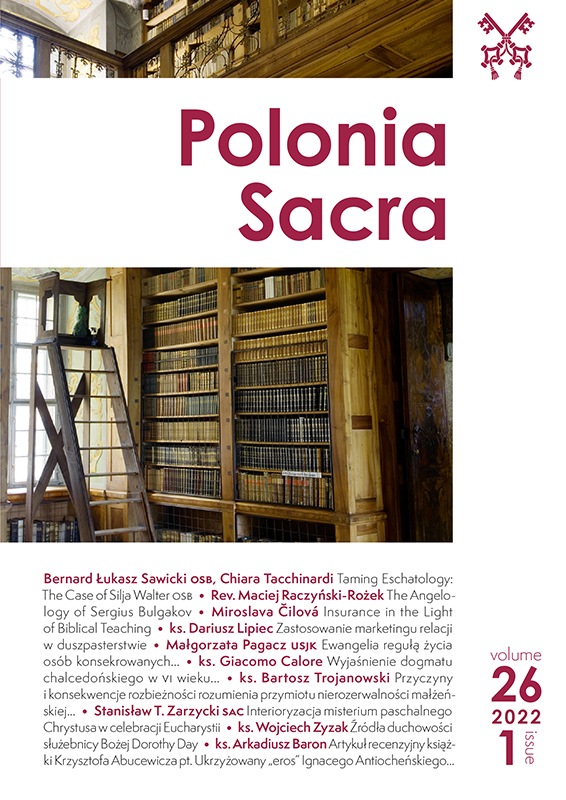Wyjaśnienie dogmatu chalcedońskiego w VI wieku. Interpretacja osoby i natury przez teologów „neochalcedonizmu” według Aloisa Grillmeiera
DOI:
https://doi.org/10.15633/ps.26106Keywords:
The Council of Chalcedon, Neochalcedonism, hypostasis, existential approachAbstract
At the Council of Chalcedon (451), the Fathers introduced a clear and previously unknown distinction between the Christological concepts of person and nature. This contributed to various problems, the most important of which was the lack of a new definition of person. For this reason, the council became the subject of sharp criticism primarily from “moderate” Monophysites. In this article, with the help of Alois Grillmeier’s analysis in his work Jesus der Christus, the author presents the efforts of the two most influential theologians who defended and deepened the teaching of the Council within the framework of the so called “Neochalcedonism” in the sixth century, Leontius of Byzantium and Leontius of Jerusalem. Theses theologians developed the concept of person as the source of the nature’s existence, thus giving it an existential and primary meaning in relation to phýsis. The author explains how, based on this, they were able to fill in all the questionable deficiencies in the Chalcedonian definition.
References
Amato A., Gesù il Signore. Saggio di cristologia, Edizioni Dehoniane, Bologna 20036.
Balthasar H. U. von, Massimo il Confessore. Liturgia cosmica, a cura di E. Guerriero, trad. dal tedesco di L. Tosi, Jaca Book, Milano 20012.
Bordoni M., Gesù di Nazaret. Presenza, memoria, attesa, Queriniana, Brescia 20107.
Cayré F., Patrologia e Storia della Teologia, vol. 2, Desclée e Ci — Editori Pontifici, Roma 1948.
Galot J., Cristo contestato: le cristologie non calcedoniane e la fede cristologica, Libreria Editrice Fiorentina, Firenze 1979.
Granat W., Chrystus Bóg-Człowiek, w: Dogmatyka katolicka, t. 3, Towarzystwo Naukowe KUL, Lublin 1959.
Grillmeier A., Ermeneutica moderna e cristologia antica. La discussione attuale sulla cristologia calcedonese, trad. dal tedesco M. Angilletta, G. Gaeta, L. Perrone, Queriniana, Brescia 19852.
Grillmeier A., Gesù il Cristo nella fede della Chiesa. Dall’età apostolica al Concilio di Calcedonia (451), vol. 1/2, trad. it. E. Norelli, S. Olivieri, Paideia Editrice, Brescia 1982.
Grillmeier A., Gesù il Cristo nella fede della Chiesa. La chiesa di Costantinopoli nel VI secolo, vol. 2/2, trad. it. V. Gatti, Paideia Editrice, Brescia 1999.
Grillmeier A., Gesù il Cristo nella fede della Chiesa. La ricezione del concilio di Calcedonia (451–518), vol. 2/1, trad. it. S. Olivieri, Paideia Editrice, Brescia 1996.
Junglas P., Leontius von Bysanz, „Forschungen zur christlichen Literatur — und Dogmengeschichte VII” 3 (1908), s. 148–162.
Kosmulska B., Historyczne i doktrynalne uwarunkowania rozwoju myśli Maksyma Wyznawcy, Campidoglio, Warszawa 2014.
Leontius Byzantinus seu Hierosolymitanus, Contra Nestorianos et Eutychianos, accurante J.-P. Migne, Parisiis 1860, col. 1267–1399 (Patrologiae Cursus Completus. Series graeca, 86/1).
Leontius Byzantinus seu Hierosolymitanus, Tractatus contra Nestorianos, accurante J.-P. Migne, Parisiis 1860, col. 1399–1768 (Patrologiae Cursus Completus. Series graeca, 86/1).
Leontius Byzantinus, Solutio argumentorum a Severo objectorum, accurante J.-P. Migne, Parisiis 1865, col. 1915–1946 (Patrologiae Cursus Completus. Series graeca, 86/2).
Măgdici A., La dignità personale dell’embrione umano nella luce dell’istruzione Dignitas personae, Editura Serafica, Roma 2014.
Mazza G., Incarnazione e umanità di Dio. Figure di un’eternità impura, Edizioni San Paolo, Torino 2008.
Mcguckin J. A., St. Cyril of Alexandria. The Christological Controversy: Its History, Theology, and Texts, St Vladimir’s Seminary Press, New York 2004.
Meyendorff J., Cristologia ortodossa, trad. it. G. Guala, Editrice AVE, Roma 1974.
Milano A., Persona in teologia. Alle origini del significato di persona nel cristianesimo antico, Edizioni Dehoniane, Roma 19962.
Müller G. L., Dogmatyka katolicka, tłum. W. Szymona, Wydawnictwo WAM, Kraków 2015.
Schönborn C., Bóg zesłał Syna Swego, tłum. i oprac. L. Balter, Pallottinum, Poznań 2002.
Sesboüé B., Wolinski J., Bóg zbawienia, w: Historia dogmatów, t. 1, red. B. Sesboüé, tłum. P. Rak, Wydawnictwo M, Kraków 1999.
Sobór Chalcedoński, Definitio Fidei, w: Dokumenty Soborów Powszechnych. Tekst grecki, łaciński, polski, t. 1, oprac. A. Baron, H. Pietras, tłum. T. Wnętrzak, Wydawnictwo WAM, Kraków 2007, s. 214–225 (Źródła Myśli Teologicznej, 24).
Sobór Konstantynopolitański II, Anathematismi adversus „Tria capitula”, w: Dokumenty Soborów Powszechnych. Tekst grecki, łaciński, polski, t. 1, oprac. A. Baron, H. Pietras, tłum. T. Wnętrzak, Wydawnictwo WAM, Kraków 2007, s. 284–303 (Źródła Myśli Teologicznej, 24).
Widok N., Stanowisko Grzegorza z Nazjanzu wobec formuły trynitarnej: mía ousíatreis hypostáseis, „Vox Patrum” R. 23 t. 44–45 (2003), s. 221–233.
Downloads
Published
Versions
- 2022-03-31 (2)
- 2023-01-26 (1)
Issue
Section
License
Copyright (c) 2022 Giacomo Calore

This work is licensed under a Creative Commons Attribution 4.0 International License.
Authors who publish in this journal agree to the following terms:
- Authors retain the copyright and full publishing rights without restrictions and grant the journal right of first publication with the work simultaneously licensed under a Creative Commons Attribution 4.0 International License that allows others to share the work with an acknowledgement of the work's authorship and initial publication in this journal.
- Authors are able to enter into separate, additional contractual arrangements for the non-exclusive distribution of the journal's published version of the work (e.g., post it to an institutional repository or publish it in a book), with an acknowledgement of its initial publication in this journal.
- Authors are permitted and encouraged to post their work online (e.g., in institutional repositories or on their website) prior to and during the submission process, as this can lead to productive exchanges, as well as earlier and greater citation of published work (See The Effect of Open Access).

